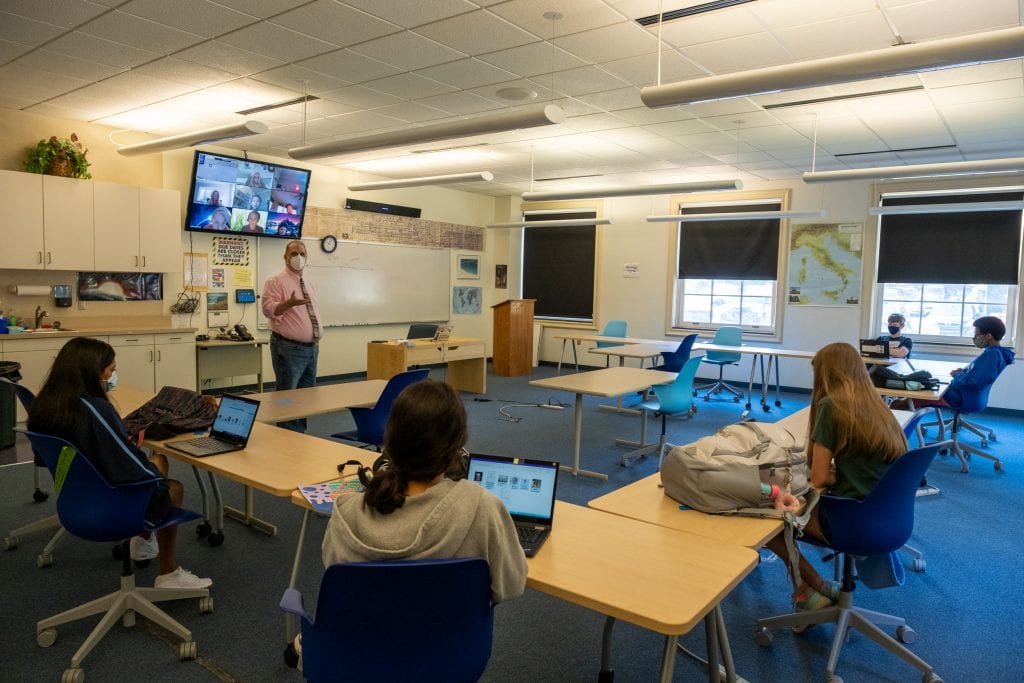Last week, I was invited to eavesdrop on a discussion between a small group of employees and Dr. Bettina Love, author of We Want to Do More than Survive: Abolitionist Teaching and the Pursuit of Educational Freedom. A note: this year all CA employees are participating in small reading groups centered on anti-racism, and each group is focusing on a different book.
Given that one group was reading Dr. Love’s book, Ms. Johnson-Webb invited her to speak, and Dr. Love kindly agreed. Members of the Leadership Team were invited to observe as well.
Even through the imperfect lens of a Zoom call, Dr. Love and the CA employees talked about a variety of issues and concerns, exploring the complexities and intersections of education and race.
I don’t remember the prompt, but at one point, Dr. Love said, “we need to reframe that basic question that every kid is asked. As adults, we shouldn’t be asking ‘What do you want to be when you grow up?’.”
She paused.
“Instead,” she said, “we should be asking ‘What problems do you want to solve?’”
I almost knocked my computer off my desk in my scramble to grab my notebook. What an incredible insight, I thought, scribbling down the quotation.
Since then, I’ve been ruminating on that assertion, teasing it apart, thinking about why it resonates so much for me.
Immediately, the reframed question warmed my English teacher’s heart for rhetorical reasons: Dr. Love shifted the verb from a state-of-being predicate to an action verb, from a static equation to a dynamic process. If there’s one grammatical point that encapsulates the essence of our mission at Cary Academy, it’s that lesson on effective writing: to be a good writer and a good student, one should generally eschew linking verbs and employ action verbs. Good students are not basic unyielding assertions; they are discovering, innovating, collaborating—they are constantly re-creating themselves. They are more than simply a grade on a project, a number on a standardized test, a momentary snapshot on a report card.
Dr. Love’s revised question also reframed the relationship the student has with others. The original question—“what do you want to be when you grow up?”—focuses solely on the individual; it’s all about the “you.” The revised query—“what problems do you want to solve?”—implies a relationship with the people around us. To reframe the question again: how will you help our society?
Finally, I appreciate the new version because it doesn’t end with an implied period (yes, I know, both independent clauses end with a question mark, but you know what I mean). “What do you want to be when you grow up?” contains a degree of finality, the idea that when you reach the mature age of 25? 35? 45? 55? you will know what profession will define you, and then you are done, and you stride into the sunset blissfully, sharing bits of professional wisdom with all around you, your life complete.
Even as I write this sentence, I’m stifling giggles at that concept.
Much better to focus on the changing nature of our interests. “What problems do you want to solve?” allows students to tackle issues now, giving them room to develop skills to explore and address other challenges in the future. In short, the mindset allows for growth.
And that’s vital, given the past eight months.
Consider the recent social upheavals that require moments of development for all of us: we ease out of bed in the morning, and life says, “so, are you going to the grocery store today?” Even the act of buying apples and potatoes becomes a logistical puzzle sometimes akin to solving a Rubik’s cube.
Certainly, our personal lives have continually required us to answer that question. Our professional obligations add to the difficulty.
Cary Academy employees have modeled how to handle all these new challenges. Daily, teachers and staff face constant queries: how shall we teach a face-to-face cohort, a completely virtual cohort, and a two-day-per-week virtual cohort at the same time? How does this new camera work? Where can I record this video for a flipped classroom while not wearing a mask at school? Which way do I walk down this stairway? Once again, I am in awe of my fellow CA employees and how they showcase the ethos of Cary Academy—they consistently hone the skills necessary for discovery, innovation, and collaboration, and if something falls apart today, don’t worry, we have tomorrow, and we will improve. What a fantastic lesson lived every day.
We model Dr. Love’s question every day, but it’s necessary to see—to actually see—the question consciously. So, for ourselves, for each other, for our CA family, for our broader society: what problems do you want to solve?

